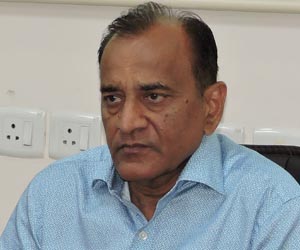A clamour to repeal the law dealing with sedition gains ground every time the police somewhere in the country files a case under the provision. The most recent example of this has happened in Bengaluru, when the Karnataka police
registered a case of sedition against Amnesty International India. The NGO had organised an event in the city as part of its ‘Broken Families’ campaign, to highlight the sufferings of people of Kashmir as a result of the unrest there. The function degenerated into chaos after some people in the gathering raised pro-Indian Army slogans, which were countered by shrill calls from other sections of the audience for Kashmir’s ‘azadi’ and other similar and by now well-known rant against the Indian state. The police booked Amnesty International India, invoking, among other laws, Section 124(A) of the Indian Penal Code, which deals with sedition.
Not surprisingly, politics soon came into play. Amnesty accused the Indian state of seeking to muzzle the constitutional rights of citizens, including the right to free speech. The Congress high command in Delhi distanced itself from the action its party’s Government in Karnataka had taken. A senior Congress leader let it be known that he had spoken to the Chief Minister of the State and had secured an assurance that no arrests would be made before a proper investigation. So, here we have a situation where a State police is poised to work under the directives of a party leader from Delhi. Then there is the fact that the case of sedition was lodged following a complaint by the Akhil Bharatiya Vidyarthi Parishad (ABVP), which is the student wing of the Bharatiya Janata Party ruling the Centre. Further, Amnesty International India’s executive director, Aakar Patel, is a noted political commentator who has been often critical of the Government in power.
With so much politics around and passions running high, it is difficult to see how the Karnataka police will be able to handle the issue impartially. It is already working with its hand tied behind its back. The case will, of course, be tested in the court, which will determine if sedition is prima facie established. Meanwhile, voices for and against the sedition charge will continue to be raised. Aakar Patel has maintained that the accusation is “unfounded” since the event was meant to highlight human rights issues —which is not a seditious exercise. On the other hand, noted jurist and former Lokayukta of Karnataka, Santosh Hegde, has justified the action, arguing that the event had been reduced to a brazen anti-national exercise.
A similar controversy had erupted in February when a case of sedition was filed against students of Jawaharlal Nehru University in Delhi, over an event they had organised to protest against the ‘extra-judicial killing’ of terrorists Maqbool Bhatt and Afzal Guru. Provocative slogans demanding the disintegration of India and calls for more Afzal Gurus to rise, were given. Apologists of the function said that raising of slogans was a right the Constitution gave them; in any case, those who had raised the cry were not students of the university. They alleged that the Government of India was misusing the sedition law to clamp down on dissidents. The matter is now before the courts.
A few months before the JNU incident, a folk singer in Tamil Nadu, Kovan, was picked up by the Chennai police on charges of sedition, for having penned offensive lyrics directed at Chief Minister J Jayalalithaa. He was charged with sedition — seeking to promote enmity and hatred in society.
These are just a few examples which have over the months raised the decibel on the subject of sedition. A robust debate on Section 124(A) of the IPC now deals with two broad questions: First, should the Section be tweaked to prevent its misuse? Second, should the law be done away altogether? There are strong opinions on either side. There is a section which believes that any tweaking of the provision must actually plug the loopholes that allow for brazen anti-national activities to escape the clutches of this law. On the other hand, opponents are firm that Section 124(A), which the British, when they ruled India, had brought to counter Indian freedom-fighters, had outlived its purpose and must be scrapped.
There is, of course, history, behind the law on sedition. Independent India’s first Prime Minister, Jawaharlal Nehru, had not been comfortable with the provision and had said that the “sooner we get rid of it, the better”. He had called it “highly objectionable and obnoxious”. He was no doubt influenced by the law’s use to crack down on freedom-fighters. But nothing was done to repeal it during his tenure, and in the terms of successive Prime Ministers. This has had less to do with the lack of commitment of Governments over the decades to freedom of speech, and more in keeping with the realities on the ground. The country has been troubled by various secessionist and violent movements — the call for Khalistan; the campaign for the ‘liberation’ of Kashmir; the Maoists carnages and drive against the Indian state; the insurgencies in the North-East. Therefore, political parties and their leaders, whatever their public pronouncements may be (in order to score brownie points), have realised that the need for a law against sedition must remain in place. Which is why most mainstream political parties have limited their ire against their ruling rivals to the ‘misuse’ of Section 124(A). They do not seek the provision’s abolition.
A great deal of the controversy revolves around the matter of interpretation. A bare reading of Section 124(A) is as follows: “Whoever, by words, either spoken or written, or by signs, or by visible representation, or otherwise, brings or attempts to bring into hatred or contempt, excites or attempts to excite disaffection towards the Government established by law in India, shall be punished by imprisonment for life…” The Section then goes on to define ‘disaffection’ as including ‘disloyalty and feelings of enmity”. There are exemptions, too. Comments that are critical of the Government with a view to seeking changes by “lawful means”, and “without exciting or attempting to excite hatred, contempt or disaffection”, do not constitute an offence under this Section. Critics of the law have argued that state authorities have often slapped sedition charges against people on the imagined pretext that the latter’s actions or words were designed to cause unrest, hatred and violence.
An NGO, Common Cause, has now moved the Supreme Court against the law on sedition, claiming that it is being misused to harass students, the intelligentsia and journalists who dare to raise dissenting voices — it’s “to install fear and scuttle dissent”. Common Cause says that the current spate of sedition charges against individuals and organisations went against the guidelines that the apex court had laid down in the Kedar Nath versus State of Bihar case of 1962. The Common Cause petition has come in the backdrop of the Amnesty imbroglio. There is another case that needs to be studied alongside, to have a clearer understanding of the law to check sedition — Balwant Singh and Another versus State of Punjab (1995). Let’s deal with the second instance first.
Balwant Singh and his accomplice had raised anti-India and pro-Khalistan slogans the day Indira Gandhi was assassinated on October 31, 1984. They had also called for claiming Punjab from the Hindu population. They were booked for sedition. A two-judge Bench of the apex court dismissed the plea, observing that “raising some slogans only a couple of times by the two lonesome appellants which neither evoked any response nor any reaction from any one in the public, can neither attract the provisions of Section 124(A)… Some more covert action was required to bring home the charge…” (of sedition). The Bench cautioned that in such cases, “over-sensitivity” could be “counter-productive” and an invitation to “trouble”.
While those who demand the repeal of Section 124(A) can take solace from the above ruling of the Supreme Court, they need to remember that the court did not hold the law unconstitutional but only cautioned the authorities to not over-react. ‘Raising some slogans only a couple of times’ — this is an important phrase. What happens when, in an event, ‘only a couple of times’ progresses to a bunch of anti-India sloganeering mob, repeating their act over and over again? Also, what about the fact that such incidents become a trigger for further similar events to be held across the country to spread anti-national and pro-terrorist sentiments? The court ruling does not give a free hand to sedition-laden acts. Moreover, it must be kept in mind that, as the court observed, the slogans by Balwant Singh and his accomplice had not resulted in any response from the public that went against the Indian nation. But in the string of incidents that we have been witnessing over the past many months, one anti-India activity has led to another, and in different parts of the country. There is a pattern that cannot be ignored.
Let us now come to the Kedar Nath Singh versus State of Bihar case. A five-judge Bench held Section 124(A) as constitutionally valid. It said that, though the provision imposed restrictions on the fundamental freedom of speech and expression, those restrictions were in the “interest of public order and within the ambit of permissible legislative interference with the Fundamental Rights”. This was the first time that the apex court had considered the legality of the law on sedition, when seen in the context of Article 19 of the Constitution of India, which ensures freedom of speech and expression as a Fundamental Right, but also places restrictions on the same in certain circumstances.
But the Bench did clarify that the essence of the crime of sedition has to be that the crime must intend to have the “effect of subverting Government by violent means”. Also that, “mere strong words used to express disapprobation of the measures of Government with a view to their improvement or alternation by lawful means” is not sedition. In other words, the court indicated that any misuse of the Section would be in violation of Article 19 of the Constitution.
There cannot be any dispute with the position that all forms of dissent or criticism directed at the Government or the Indian state should not be hit by the hammer of Section 124(A), and that caution must be maintained. But, it is difficult to imagine how calling for the break-up of India or eulogising terrorists who have claimed hundreds of innocent lives, directly or indirectly through their actions, can be considered as ‘mere strong words’ with an objective to lead to the ‘improvement or alteration of the Government’s functioning through lawful means’. The idea in such cases is far from being constructive. It’s more to do with the dismemberment of the very nation.
The conflict between those who support the law against sedition and those who want it done away with, has to also do with the rights that Article 19 of the Constitution gives to every Indian citizen, and which were referred to by the Supreme Court in the Kedar Nath case, while upholding the validity of Section 124(A). Given the innumerable times it has been invoked in different contexts, Article 19 has become one of the most familiar provisions of the Constitution to most people. Opponents of the sedition law have often claimed that the IPC Section went contrary to the spirit of the Article in question. Article 19 deals with the ‘Right to Freedom’, and its Clause 1(a) says, among other things, that “all citizens shall have the right to freedom of speech and expression”. But there is also Clause 2 of the said Article which imposes certain restrictions on such free speech or expression: “Nothing in Sub-Clause (a) of Clause (1) shall…prevent the state from making any law, insofar as such law imposes reasonable restrictions on the exercise of the right conferred” by Clause 1(a). This came about by an amendment to the Constitution in 1963 — the Constitution (16th Amendment) Act.
But there was another amendment that had been brought earlier and which set the tone for the exceptions that we have today. Interestingly, this amendment to the Constitution to restrict freedom of expression and speech in the national interest, came via the Constitution (First Amendment) Act, 1951, with the full backing of the liberal democrat, Nehru. It’s through this amendment that ‘restriction’ became constitutional; that ‘libel and slander’ became ‘defamation’; and terms such ‘public order’ and ‘incitement’ became useful terminology to differentiate between harmless sloganeering and an act of sedition. This history also explains why the Congress is reluctant to lend its support to the dismantling of Section 124(A), which draws oxygen from the amendment to Article 19.
It is obvious that the legal position on the validity of Article 19 as it stands in its amended form with the restrictions on free speech, has been established, and is unlikely to be reviewed. Section 124(A) too has passed legal muster in the past, but its legality continues to be questioned and assaulted. Will there be a reconsideration by the apex court? That’s the million dollar question.
In sum, the problem is not so much in the law on sedition — even if the call for a review has generated a welcome debate. The problem often lies with the maximalist approach that law enforcing agencies like the police take in in-stances which do not call for an extreme reaction. There are several provisions in the Indian Penal Code that can be invoked to handle such situations. While they do get slapped on alleged offenders, the law on sedition, if wrongly imposed, can spoil valid cases that is made out through the other Sections.
To make matters worse, there are always political outfits that are eager to make martyrs out of people and organisations faced with the sedition charge (rightly or wrongly). Political leaders think nothing of the damage they cause to national security when they jump the gun — rendering clean chits even before the police or other probe agencies complete their work — to cater to a certain constituency. We have seen this happen in Amnesty’s case, when the Home Minister of Karnataka has virtually absolved Amnesty over the anti-India ruckus and instead blamed the ABVP, with a view to cornering a political opponent.
And finally, it would help if the media, especially news television, refrains from getting hysterical on such issues and raising the pitch to an extent that it becomes impossible for the audience to form a considered opinion that is both informed and solution-centric. While it is natural for public sentiment to be fired up over matters relating to nationals security and sovereignty, it is not good when public perceptions get shaped by jingoism.
(The writer is a senior political commentator and public affairs analyst)
Published Date: 23rd August 2016, Image Source: http://media.indiatimes.in
(Disclaimer: The views and opinions expressed in this article are those of the author and do not necessarily reflect the official policy or position of the Vivekananda International Foundation)










Post new comment